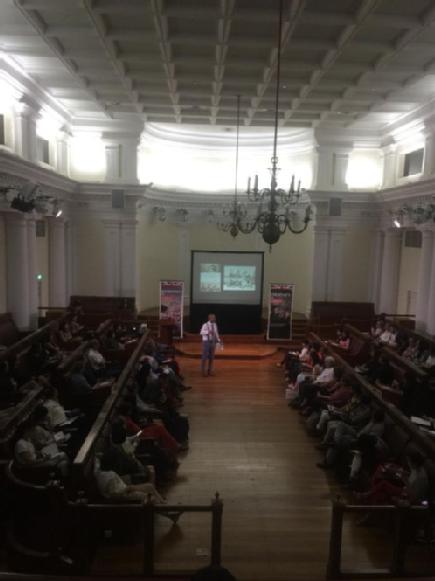Warwick Law School News
Warwick Law School News
The latest updates from our department
Spotlight on Research: Profiting from Disparity
In collaboration with the British Council, Dr Mohsen Al Attar, Associate Professor at Warwick Law School, recently delivered a lecture entitled Profiting from Disparity at the Singaporean Arts House. The event was attended by a mix of academics, journalists, high school and university students plus familiar Warwick alumni faces.
Mohsen credits the strong turnout to the topic of the lecture. “Interest in economic inequality spiked following the financial crisis of 2008 and the austerity policies adopted by nations across the world, policies supposedly devised to resolve the economic crisis. A decade later and all evidence suggests that the austerity policies were opportunistic, implemented to usher a colossal transfer of wealth to the richest classes.”
His talk was based on his current research project (Profiting from Disparity) in which he is investigating the role law plays in making both these levels of accumulation and of disparity possible. When asked about his research, he told us, “the word ‘profit’ is deployed in verb form to underscore the exploitative relationship that exists between the tiny few who succeed and the many millions who are exploited in the course of making their success possible. 
“Exploitation or ‘taking wrongful advantage of someone to satisfy your own ends’ is systemic in modern British society and the global economy widely. It is not that laws simply fail to counter exploitative behaviour, it is that they exacerbate some of the worst practices. An easy example is the eponymous free trade zone: states demarcate a geographic area within their jurisdiction as an ‘extra-territorial space’ destined for labour intensive activities such as textile manufacturing. Next they dis-apply laws within the zone creating a type of legalised lawlessness. Which laws are dis-applied? The list is edifying for its gall: among others, a mix of labour, health and safety, taxation, and environmental laws.
“Economists and policy makers who endorse these zones point to hikes in GDP and economic activity as sufficient justification. Yet they amount to little more than legal exploitation: the state suspends its own laws to create a space where corporations are at liberty to treat workers in ways that parallel some of the barbarities of the industrial revolution. Exploitation proves to be good business.”
So what does the future hold for Mohsen’s research? “As I continue to explore, we require a two-fold strategy to counter the exploitative practices being legislated. First, a position must be taken against exploitative relationships. For this, a comprehensive welfare system that provides a dignified living standard – rather than a minimum one – is essential. Only then are people in a position to refuse to participate in their exploitation. Without this, we should not be surprised when workers accept dire conditions to survive.
“Second, we should abandon the fallacious pursuit of equality. As soon as private accumulation is accepted as the raison d’être of government, so too must we accept the inevitable economic disparities that ensue and that ultimately corrupt even the minimal forms of political equality that we take for granted. Managing inequalities is a more viable policy. We start by accepting that our system will create far more losers than winners and design policies to ensure that the gap never grows too great, lest the power differentials lead to the imbalance we observe today: progressive taxation, limits on land ownership, rent control, and more. In short, policies that acknowledge that, without safeguards, the ability of the wealthy to exploit others will grow endlessly.”
Faculty members at Warwick Law School are eager to make their research more accessible to the wider public and events such as this (organised in collaboration with the British Council’s office in Singapore) provide an ideal platform to achieve just that.
The Law School is excited to see where Mohsen’s research takes him next and the impact his findings will have on wider issues.
